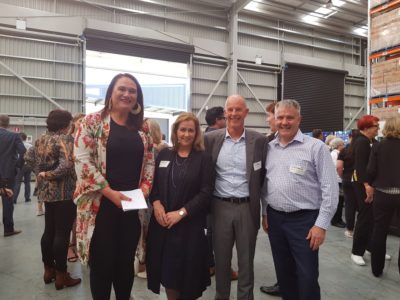
Looking at the brand spanking new warehouse and food distribution office at Highbrook Business Park, it’s hard to believe that it all happened in 15 weeks.
The pandemic got things to speed up. The idea behind The New Zealand Food Network (NZFN), which was waiting to be approved, got immediate attention from the government.
An unprecedented demand for food parcels in communities all over the country was the trigger that gave the much-awaited nod to funding of NZFN – a not-for-profit organisation that provides a streamlined solution, bridging the gap between food donors and food banks, iwi and charities.
At a gathering to officially launch the new facility that has been functioning since July, NZFN founder Deborah Manning, an experienced lawyer, said after reading an article on Dumpster Divers, she was keen to see that surplus food from supermarkets, growers, manufacturers that were destined to go landfills was distributed to food rescue organisations and community groups.
Not many are aware that New Zealand industry generates more than 103,000 tonnes of food waste per year, and it is estimated that 60 per cent of food going to landfill is edible.
Burying food (and often it’s packaging) in landfill is an environmental disaster.
That’s how the idea of food sharing was born and KiwiHarvest, a sister organisation was first founded by the food champion, a leading voice in advocacy, strategy and education on food waste issues.
However, they soon realised that with the network of generous supporters who donated food steadily growing, there was not enough infrastructure or storage to stock the food. A huge warehouse to store and distribute bulk food was the need of the hour.
Gavin Findlay CEO of KiwiHarvest and NZFN, says it was the fastest pace that the government has worked on when Covid struck.
“We don’t have to turn away large food donations anymore and can get food to where it’s needed-to the most vulnerable communities.”
Matt Dagger, general manager of Kaibosh Food Rescue, Wellington said, “The system is nothing short of magic!
Every morning the food that’s available – be it apples, tomatoes, meat and more – shows up on our computer screen and all you have to do is tick the boxes of the produce you’d like. Within 24 hours it is at your doorstep.”
Minister for Social Development, Carmel Sepuloni, praised the coordinated effort where New Zealand has access to the very basic dream, which is food.
One of the food partners, Pete Davis, national marketing manager of Sanitarium Food Health Company, said they noticed in March that they had surplus food in the corporate pantry which was dating.
“We had food meant for promotions, samples and events that we sponsor, all of which had got cancelled. And since we are exactly set up to distribute food, we are very grateful to NZFN, and are actively supporting them.”
In the short months since its establishment, the NZFN has distributed more than 520,000 kilos of food (the equivalent of 1,485,700 meals) to food hubs across the country.









